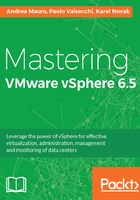
Features and editions of vSphere 6.5
VMware vSphere is licensed in different ways and different packages and bundles, usually identified by a stock keeping unit (SKU) code. There are some bundles (like vSphere with Operations Management Enterprise Plus), OEM, ROBO and VDI specific SKU, or other license models (such as ELA) that we will not consider and describe.
For more details, you can consult the official VMware (vSphere) licensing page at https://www.vmware.com/support/support-resources/licensing.html.
For VMware vCenter Server, the licensing model is quite simple per instance and with three different editions:

Table 1.4: vCenter features across different editions
For ESXi, the license is entitled per socket (except in some specific bundle or SKU, such as ROBO or VDI) and there are different editions with different features.
Note that since June 30, 2016, the ESXi Enterprise, vSphere with Operations Management Standard/Enterprise editions are no longer available. Customers who already own Enterprise versions are not yet affected (their current editions will continue to be supported through the EOA of vSphere 6):

Table 1.5: Product features with different vSphere editions
For ESXi, there are also the Free Hypervisor and the Essential editions; both are quite limited in function (no cluster function at all) but do not have specific limitations on the resources at the level of a single host.
The Free Hypervisor edition does not include the VDAP API, that means no native backup capability for all the backup software that uses that interface, and does not include either the vCenter Agent, that means no way to manage from vCenter.
For SMB, there are two specific bundles—vSphere Essential and Essential Plus Kit, that combine one instance of vCenter Essential and six licenses (usable on a maximum of three hosts) of ESXi Essential or Essential Plus. Both bundles have an interesting price, making virtualization also possible for companies with budget constraints.
For enterprises, depending on the size and the business requirements, for ESXi licensing, usually Standard or the Enterprise Plus can be used.